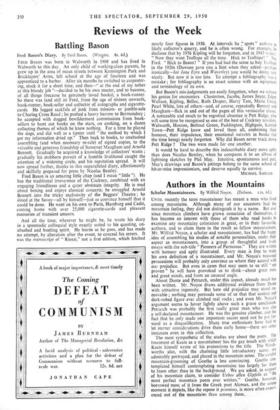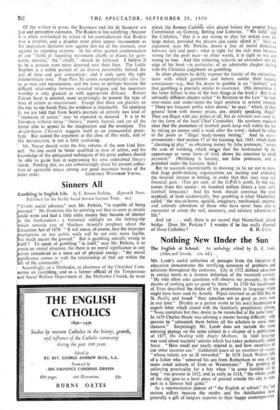Authors in the Mountains
Scholar Mountaineers. By Wilfrid Noyce. (Dobson. r as. 6(1.) UNTIL recently the term mountaineer has meant a man who lived among mountains. Although many of our ancestors had the mountain feeling, they did not distinguish it by a name. But ever since mountain climbers have grown conscious of theinselves, it has become an interest with those of them who read books to examine any mountainy coloration in great, or in their favourite, authors, and to claim them in the result as fellow mountaineers. Mr. Wilfrid Noyce, a scholar and mountaineer, has had the happy idea of assembling his studies of notable personalities, under their aspect as mountaineers, into a group of thoughtful and lively essays with the sub-title " Pioneers of Parnassus." They are written with humour and aptly illustrated. Every man is free to make his own definition of a mountaineer, and Mr. Noyce's reasoned persuasions will probably only convince us where they accord with our prejudice. But even in cases that may seem to us still " not proven " he will have provoked us to think—about great men, and great minds, and from an unusual angle. About Dante and Petrarch, under this aspect, already much has been written. Mr. Noyce draws additional evidence from Dante with attractive ingenuity. But here old prejudice may stand im- movable • nothing may persuade some of us that that austere and dark-robed figure ever climbed real rocks ; and even Mr. Noyce's argument seems to hover lightly above such a grave conclusion. Petrarch was probably the first really great man who was also a self-declared mountaineer. He was the genuine climber, and the fact that he only made one important ascent need not be put for- ward as a disqualification. Many true enthusiasts have had to let sterner considerations drive them early home—there are other instances even in this collection. The most sympathetic of the studies are about the poets. The treatment of Keats as a mountaineer has the gay touch with which Keats himself wrote of his pretensions to the title. The Words- worths also, with the charming little introductory scene. are admirably portrayed, and placed in the mountain sense. The careful mountain-grooming of Goethe is less convincing. Goethe con- templated himself contemplating- mountains' too largely for them to loom other than in the background. We are asked, in support of his mountain claim, to consider Ueber alien Gipfeln as the most perfect mountain poem ever written. "\ Goethe, however, borrowed most of it from the Greek poet Alcman, and the serene moment it depicts, like the repose it promises, is more often experi- enced out of the mountains than among them.. Of the writers in prose, the Rousseau and the de Saussure are just and perceptive estimates. The Ruskin is less satisfying ; because it is often overlooked by critics of hi& contradictions that Ruskin was a prophet, and a prophet must often appear inconsistent as his inspiration declaims now against this sin of the moment, now against its opposing extreme. In his often quoted condemnation of our "habit of regarding mountains chiefly as places for gym- nastic exercise," the " chiefly - should be italicised. I believe it to be a censure even more deserved now than then. The Leslie Stephen is a subtle pursuit of an elusive personality behind the veil of time and past convention ; and it ends upon the right indeterminate note. Pope Pius XI comes sympathetically alive for us as man and mountaineer, and the more so perhaps because the difficult relationship between revealed religion and his mountain worship is only glanced at with appropriate delicacy. Robert Falcon Scott is selected, most surprisingly, to present the type of man of action as mountaineer. Except that there are glaciers on the way to the South Pole, the evidence is impalpable. To reinforce it, we are told that from Scott's journals an entirely new kind of literature of action " may be expected to descend. It is to be literature without being " literary," merely factual, and yet all the better able to appeal to the imagination and the emotions. The Anglo-Saxon Chronicle suggests itself as an unsuccessful proto- type. But indeed the argument at the close of this study, and of the introduction, is not a little confusing.
Mr. Noyce should write the first volume of the new kind him- self. No one could be better qualified as man of action, and his knowledge of the antiquated techniques of his great authors should be able to guide him in suppressing his own undoubted literary talent. Pending this, we can unhesitatingly place his present collec- tion of agreeable essays among our good mountain books of the



























 Previous page
Previous page